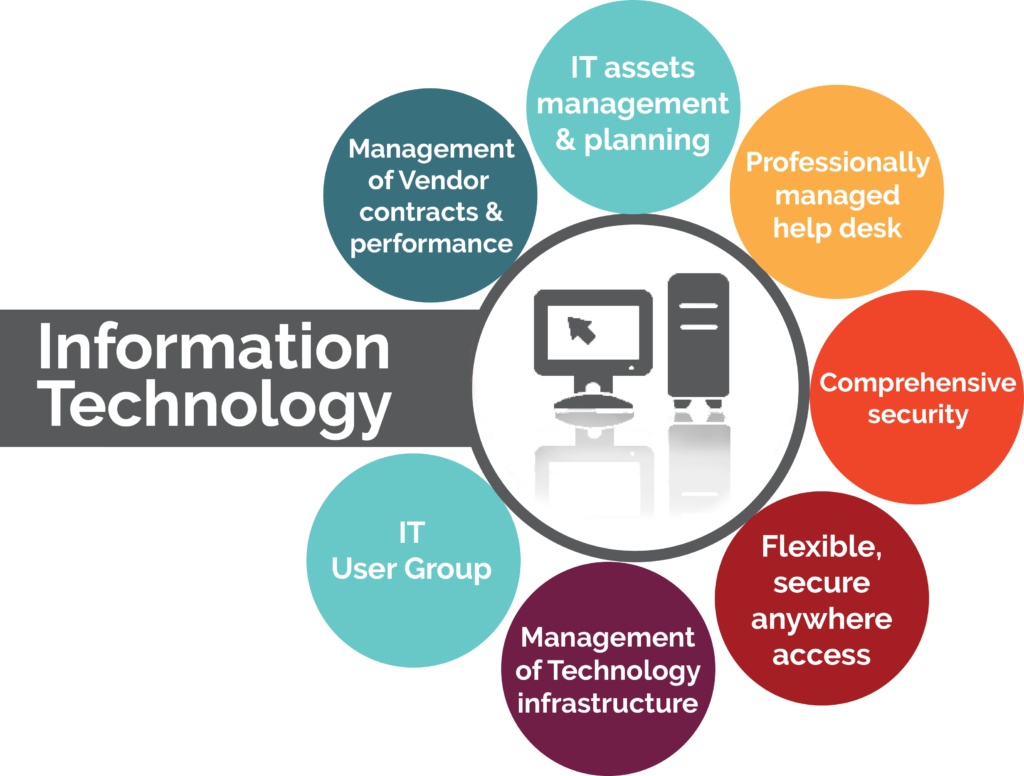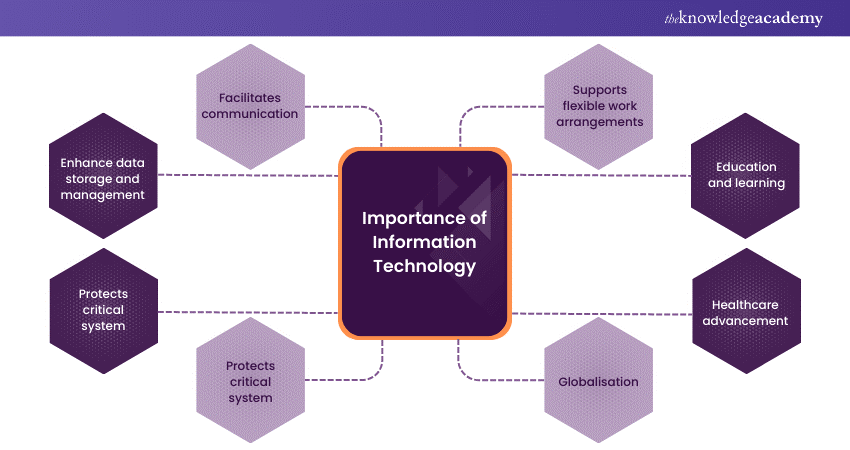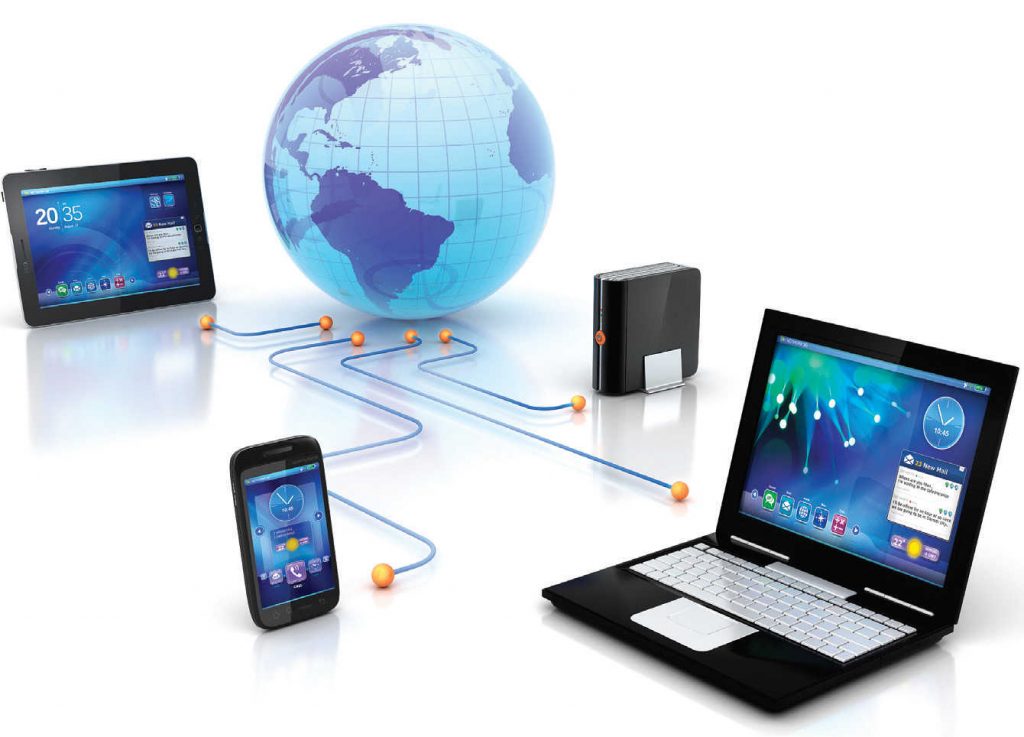What are the advantages of information technology?

Information technology is the collection, processing, storing, transferring, and managing of data and information via the use of computer systems, software, and digital technologies. These days, digital technology and communication are identical in form. Information technology covers everything, including using a laptop to conduct Zoom meetings with the team and reading mail. Information technology even involves analyzing consumer data and live broadcasting social media.
You can gain a lot of advantages from information technology. It is becoming a necessary component of our everyday activities. Information technology offers several opportunities for people to advance in their jobs. Learn more about information technology by reading this blog, which covers topics including what information technology is, why it matters, how it’s used in many fields, and much more.

Table of Contents
1.What is Information Technology?
Information Technology utilises computer systems or devices to access information. It is a mixture of both technology and information. This system is accountable for the broad area of any business operation, workforce, and personal information. It deeply impacts our daily lives. It is a very common technology that is used by each and every organisation to enhance their business skills. An individual can use this for both commercial and personal purposes. International companies are moving forward towards Information technology for managing and innovating data based on their processes. Flea Market sellers are one of the best examples of Information Technology that uses smartphone credit card readers for collecting payments from street performers through Venmo names. Another example of Information Technology is using a spreadsheet for monitoring your monthly expenses.
Role of Information Technology
It’s time to comprehend information technology’s role now that you have a solid concept of what it is. Information technology is integral to any corporate organization and provides a solid base for its current workforce. Data management and communication are just two areas where information technology has established a unique position in raising productivity to the highest level. We shall now comprehend the function of information technology across many sectors.
Business
For many firms, information technology is an absolute necessity. Many corporate processes in today’s information-driven economy rely on information technology systems, especially network, computer, and data management systems. People perform their job functions in a variety of organizations by using computers and general-purpose or industry-specific software. For example, software is now used by accounting departments to generate financial statements and do other bookkeeping tasks. Technical applications are used by human resources to manage all aspects of hiring, training, paying employees, and terminating employees. The same applies to production, marketing, sales, project management, and security.
Education
The field of education has seen significant transformation thanks to information technology. It has evolved into a fundamental instrument that transforms the processes of teaching and learning for both teachers and students. IT plays numerous important functions in today’s educational environment. By offering an abundance of online content, such as interactive learning platforms, research articles, and textbooks, it improves accessibility to educational materials. Through online collaboration, virtual classrooms, and multimedia presentations, IT makes innovative teaching approaches possible. Technology helps with administrative tasks in educational establishments, such as scheduling and record-keeping for pupils and easing parent-teacher contact.
Banking
Information technology (IT) has revolutionized the way financial institutions function and provide services to their clientele, revolutionizing the banking industry. It now forms the foundation of contemporary banking and has an effect on many facets of the sector. Numerous banking procedures have been automated because to information technology, greatly increasing productivity. Customer support, account administration, and transaction processing may now be done with little to no manual interaction. This has decreased the chance of human error in addition to operating expenses.

Lorem ipsum dolor sit amet, consectetur adipiscing elit. Ut elit tellus, luctus nec ullamcorper mattis, pulvinar dapibus leo.
E-commerce
In the e-commerce sector, information technology is a game-changer. Mobile applications and e-commerce websites are designed, developed, and maintained by IT departments. By integrating with different payment gateways and processing different payment methods including credit cards, wallets, and cryptocurrencies, it also makes safe online transactions easier. IT systems play a critical role in e-commerce by tracking and managing inventory in real time. Additionally, it facilitates expediting order fulfillment, packaging, and delivery.
Employment
By boosting productivity, opening up remote work options, and creating jobs, information technology plays a significant role in the labor market. It promotes employment growth in tech-related industries including data analysis, cybersecurity, and software development. Additionally, it makes a variety of industries more efficient and automatable, which eventually spurs economic growth and creates a wide range of job opportunities.
Enroll in our Visual Basic Programming For.NET Course right away to learn how to use class designers effectively!
Importance of Information Technology

There are several reasons why information technology is so important. Let’s comprehend the subsequent rationales.
1) Facilitates communication: The way people communicate with each other has changed as a result of information technology. The Internet, smart gadgets, and social media have made it possible to transport information quickly throughout the world, which has completely changed how businesses run and interact with their customers. Nowadays, a lot of businesses—even tiny, one-person operations—have a website. Businesses can use the Internet to interact with audiences through a variety of channels, attract talent, form alliances, and establish their brand identity on a fixed budget.
2) Improve data management and storage: Information technology has also changed how people and organizations handle and store their data. Many firms now employ digital databases, which are less expensive to operate, take up less space, and are protected from physical damage thanks to technological advancements. Many databases are available that are capable of storing, retrieving, and processing data quickly. Businesses can choose to keep their data systems on-site or on the cloud.
3) Safeguards vital systems: An area of information technology aids in the protection of databases, networks, and computer systems. IT security helps with data recovery in the event of a technological disaster and protects infrastructure from threats. Businesses can operate more smoothly thanks to information technology, which also offers standards and procedures to safeguard data, including trade secrets and customer information.
4) Increases productivity and efficiency: The main advantage of information technology is its ability to increase productivity and efficiency. Organizations may do things far more quickly with the aid of digital systems than they could with physical labor. People can complete jobs faster and with fewer errors by using computer applications tailored to their own needs. IT provides solutions to streamline and expedite work, whether you want to work with massive amounts of data or perform accounting computations.
5) Encourages flexible work schedules: Information technology is also changing the way people work by providing the framework for flexible schedules, such as remote and telecommuting jobs. Contractors and employees can operate from any location as per their preference and still collaborate with their team thanks to collaborating tools.

6) Education and learning: The availability of a multitude of online educational resources made possible by information technology has transformed the educational landscape. Learning may be made more flexible and accessible with the help of educational apps, e-learning platforms, and digital textbooks.
7) Advances in healthcare: Data analytics, telemedicine, and electronic health records (EHRs) have all been made possible by information technology. It boosts the effectiveness of the healthcare system as a whole while helping to improve patient care, diagnosis, and research.
8) Globalization: Information technology has significantly contributed to globalization by removing barriers based on geography. Enterprises can broaden their global reach and activities, while individuals can establish connections with people from many cultural and ethnic backgrounds, thereby cultivating a global community.
Check out our Programming Training Course right now if you wish to master the main programming languages!
What are the services of Information Technology?
Numerous services and functions offered by information technology are crucial for individuals, businesses, and organizations. These are a few typical information technology services.
1) Hardware and software support: IT departments are in charge of managing, repairing, and maintaining computer hardware and software to ensure optimal operation.
2) Network services: Network infrastructure, such as wired and wireless networks, routers, switches, and firewalls, is designed, implemented, and maintained by IT specialists. They guarantee that information may be shared inside an organization effectively and safely.
3) Data management: IT oversees all aspects of data lifecycle management, including collection, storage, processing, and retrieval. This covers data control, disaster recovery planning, and backups to guarantee data integrity and legal compliance.
4) Cybersecurity: Cybersecurity is the process of defending Internet-connected information technology infrastructure from cyberattacks. Cybersecurity experts are needed by businesses to protect their IT systems from unauthorized access. Some tools are useful in preventing hostile attacks, including as firewalls, anti-virus software, and anti-spyware.
5) Networking: In the context of IT, networking is the sharing of data and resources through the connection of computers and other devices. It entails creating, setting up, overseeing, and maintaining wide area networks (WANs) in addition to local area networks (LANs). Data sharing, internet access, and other IT services are made possible by networking technologies such as switches, routers, and TCP/IP protocols, which allow data to be transferred and communicated between devices. Modern businesses, the internet, and communication systems all depend on networking.
Conclusion
We now hope that you are able to define information technology more clearly. We have discussed the definition of information technology, its significance, its major applications across several industries, and its various varieties in this blog. The contemporary technical industry is supported by information technology. This contributes to the expansion and success of the company. Furthermore, it facilitates the process of making well-informed decisions concerning the diverse facets of the advantages of technology.




